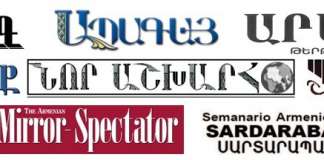Gatestone Institute has published an article titled “On anniversary of genocide, Armenians still under attack” by Turkish journalist Uzay Bulut.
The article reminds that April 24 marked the 104th anniversary of the Armenian Genocide by Ottoman Turkey. It was on this date in 1915 that Armenian intellectuals and community leaders were arrested in Constantinople and later murdered. It is estimated that between one and one and a half million Armenians perished.
“Since then, Turkish authorities have aggressively denied that the genocide even took place, or that Turks carried it out, and penalized those who dare to assert otherwise.
“The government-funded Turkish Institute of History (TTK) recently announced that it is preparing to publish 25 volumes “refuting Turkey’s involvement” in the genocide. The TTK also has produced a documentary — “The Armenian Rebellion Against the Ottoman State, Terrorism and Propaganda” — claiming that the Armenians started committing “atrocities” against Muslims in 1915, to which Turks responded by “relocating and resettling” them. As a result, according to the documentary, the Armenian diaspora proceeded to spread “lies about the so-called Armenian genocide,” the article reads.
The author notes that in addition to the Turkish government’s ongoing denial of the genocide, there is also an attempt by many members of the Turkish public to wipe out all vestiges of Armenian religion and culture.
Functioning Armenian churches in Istanbul – which are few and far between – have been vandalized on several occasions. In February, for instance, the Surp Hreshdagabed church in Istanbul’s Balat District was spray-painted with the graffiti warning: “You are finish [sic].”
Last year, the Surp Takavor church in Istanbul was spray-painted with graffiti reading: “This homeland is ours.” In 2016, the Bomonti Mkhitarian Armenian School was painted with graffiti calling to “torture Armenian[s].”
According to the author, the current population of the Armenian community in Turkey is approximately 60,000 – and shrinking, as a result of the “tense political atmosphere and violence” in the country.
“We wanted our child to live in more civilized conditions. Turkey hasn’t been peaceful at least for 5 generations. Turkey cannot manage to reach ‘the level of contemporary civilizations’ and it seems that it won’t in the next 30 years,” the article quoted one Armenian from Turkey, who moved his family to Europe, as telling Agos.
“Continuing to deny the Armenian Genocide, particularly at a time when Christians are being persecuted and slaughtered across the world, is one way for Turkey to remain backward, uncivilized and ill-deserving of its aspirations to become a part of Europe,” Bulut said, citing a recent statement by Armenian Prime Minister Nikol Pashinyan that “we do not view the recognition of the Armenian Genocide in the context of purely Armenian-Turkish relations. We see that in the context of global prevention of genocides and ensuring global security because it’s obvious that the recognition and condemnation of genocides are the most effective tools for the prevention of new genocides.”
Bulut, a journalist born and raised a Muslim in Turkey, is currently based in Washington D.C.
















